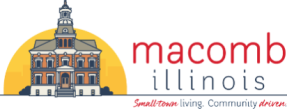With the Western Illinois University Marching Leathernecks greeting audience members as they entered the College of Fine Arts & Communication Recital Hall Friday, WIU President Kristi Mindrup and the president's leadership team prepared to deliver the annual University Assembly to kick off the new school year.
President Kristi Mindrup: Open Our Minds for What's Next
"This is an opportunity to reflect today on our mission and priorities for Western Illinois University. As WIU enters its 126th year, we recognize how our university has changed throughout distant and recent history," Mindrup said in her opening remarks. "As we begin the 2025-26 academic year, higher education across the United States is experiencing one of the most transformative periods in history. The forces shaping institutions are complex and rapidly evolving, requiring collective focus, creativity, innovation and resilience. Our efforts during the past year have positioned WIU to better adapt with agility to shifting demographics, student interests and needs, and new political pressures. Our shared goal is to move WIU from a reactionary dependent organization to one that can chart its own destiny and evolve.
"Certainly, we all agree that Western Illinois University looks different now than 52 or even 126 years ago. This does not mean that WIU is not great or that it cannot become even greater," Mindrup told those attending Friday's assembly. "Theodore Roosevelt is quoted as saying, 'Comparison is the thief of joy.' Over a career and in life, I have witnessed and participated in comparison mindset only to watch it steal from and stifle creativity, evolution and optimism. We would better spend our time talking about present success stories of our students, faculty and staff and the impact of our excellent programs. WIU will be successful at any size because of our people and our dedication to our mission. There is one question: Are we ready to let go of what we were and lift up where we are now in order to evolve into what we will be? Now is the time to open our minds to what is next for Western Illinois University."
Mindrup also outlined Western's priorities: positioning the university for enrollment success; cultivating student ambition and self-authorship; and amplifying WIU success. As part of the assembly, Provost Mark Mossman outlined Western's academic rebuild plan, which consolidates four academic colleges into two to "recognize programmatic assets, create new synergies within strategic reorganization, and position academics to align with recruitment and retention initiatives." Ketra Roslieb, vice president for finance and administration, discussed priorities and progress on Western's ongoing financial picture, while Justin Schuch, vice president for student success, discussed WIU's student profile.
Provost Mark Mossman: A New Academic Model
According to Mossman, academic affairs is engaged in phase two of the division's total rebuild. In February 2025, a constituency committee began meeting to discuss rebuilding and reorganizing academic affairs. From the start, this discussion was shaped by data from the Higher Learning Commission, accreditation reports, higher education trends, campus conversations, enrollment and budget trends, and space utilization realities WIU now faces, Mossman shared.
"The decision was made to explore one, two or three college models and ultimately proceed with a new two-college model," he explained. "The need for interdisciplinarity also emerged strongly. This interdisciplinarity encompasses much more than academic course content — it includes different perspectives across the university and student learning in all spaces, including co-curricular ones. We must create a comprehensive environment where innovative engagement can take place."
The two-college model could save the institution between $800,000 and $1.2 million. The rebuild focuses on efficiencies, disciplinary diversity, and establishing a solid fiscal and intellectual foundation that allows WIU to stabilize and evolve, Mossman noted.
Close to 64 percent of Faculty Senate, the faculty's governing body, approved the formation of a College of Humanities, Arts, Sciences and Education, and 79 percent approved a College of Business, Health, and Community programs. The Faculty Senate voted May 13 to approve the two-college model.
"The administration, Faculty Senate, UPI and other groups are working together, adhering to protocols required by collective bargaining agreements and shared governance. We've formed seven committees focusing on building spaces, interdisciplinarity, communication, advising, and they are now engaging in implementation," he explained. "The year 2025 is an opportunity year for Western. Just imagine the success we can have here and have already had. We can continue to build the lives we change and the environment we create."
The two-college model is expected to be implemented in 2026.
VP Budget & Finance Ketra Roselieb: Confronting Long-Term Deficits
Roselieb opened by acknowledging the university’s financial challenges, shaped by decades of enrollment pressures, staffing impacts, financial strain and increasing deferred maintenance.
"I often dream of prior fiscal environments when we would rush to spend funds before June 30 or when a 25 percent reduction in operating expenditures was all we had to worry about. However, to complement Dr. Mindrup's remarks, focusing on comparison to what things used to be would steal from WIU's future vision and ongoing success," Roselieb said. "This past year has seen monumental financial shifts, difficult decisions and necessary realignments as we confronted long-term deficits and restricted cash flows entering Fall 2024.
"The university made significant progress addressing the looming negative financial trajectory, reducing appropriated expenditures by over $10 million between Fiscal Years 2024 and 2025, while managing increasing contractual obligations, student support, and state and federal decisions negatively impacting higher education," she added. "The university called on the state for support by requesting additional capital dollars, advocating for equitable funding, and seeking legislative changes for more flexibility and resources. We will continue these advocacy efforts and realign institutional resources."
Roselieb stressed that Western must recognize its environment, where enrollment and external risks are greater than ever, and protecting WIU’s mission and students by remaining financially viable is crucial.
"While significant progress has been made, our work is not done. Future budgets are grounded in realistic enrollment projections and built to safeguard our mission and students," she said. "We collectively decide whether to use future dollars to hire admissions staff, upgrade lab computers, or fix elevators. Fiscal year 2026 budgets and beyond will focus on continued advocacy for equitable funding, realigning resources to protect the institution, investing in technology and a new ERP, and areas showing growth opportunities.
"Though our financial work is ongoing, we have made substantial progress and should celebrate that," Roselieb concluded. "Together, we will build on this foundation, ensuring WIU remains financially strong, mission focused and ready to serve students well into the future."
VP Student Success Justin Schuch: Your Potential, Our Purpose
Schuch told the crowd his University Assembly remarks would focus on Western's incoming student population for the 2025-2026 academic year, along with recruitment and retention plans.
"This fall, we will welcome about 5,100 students across our Macomb and Quad Cities campuses and fully online," he said. "We have about 1,450 new students calling WIU home."
The university's 10th day enrollment will be released in the second week of September. Of incoming students, 33 percent are freshmen, 30 percent transfers, 26 percent graduate students, and 11 percent returning students. Sixty-three percent of incoming freshmen are female (last year's freshman male enrollment was 43 percent, he noted). Fifty-six percent identify as white, 24 percent as Black, and Hispanic students make up nine percent. The incoming class comes from 19 states and other parts of the world, mostly Illinois and Iowa. International students are the third largest group, Schuch said.
"The number one high school for incoming freshmen is Macomb High School, followed by regional schools like United Township and Rock Island. Our team is doing an excellent job recruiting and making sure everyone knows WIU is a great place to call home," he added.
Law enforcement leads as the top major for incoming first-year students, followed by elementary education, pre-nursing, business administration, biology and agriculture. Western is also committed to a smooth transition for transfer students.
"This is an important population looking ahead. Graduation rates from high schools are expected to decline nationally and in the Midwest, with Illinois leading that decline over the next 15 years," Schuch stressed. "We must diversify our enrollment efforts, and transfer students are a key area for investment. We're excited to continue strong partnerships with Spoon River and other community colleges."
About 170 students are returning after leaving for various reasons, he said. To help all students assimilate, including returning ones, programs and initiatives are in place to ensure success.
"Our goal, especially for first-year students, is graduation in four years. You'll hear us focus on our Leatherneck First Four," he said. "One of the best ways to support student success and retention is helping students connect to WIU. Connection can be the difference in persistence and success. Our data shows students who form at least one connection within the first four weeks do better."
Western is launching "Purple and Gold Points" this fall, a gamification effort incentivizing students to participate in activities where they can earn points for prizes.
"Students are excited to earn points by attending events focused on academic success, fine arts, athletics, service, health and wellness, campus traditions, and social programming," Schuch said. "We've also updated Leatherneck Link, an online repository for resources at WIU, the Macomb and Quad Cities communities, and for online students."
Western's status as an opportunity college by the Carnegie Foundation is a recruitment asset, he said. Sixteen percent of U.S. colleges have this classification, showing Western offers students exceptional access and earnings potential.
"Not only do we have amazing academic programs and involvement opportunities, we should thrive in our opportunity college status from the Carnegie Foundation," he concluded. "This fall, Leathernecks will take over the state through recruitment and alumni events, welcoming prospective students and amazing alums. These events highlight student opportunities at WIU and celebrate our alums. As we prepare for a great academic year, it's a good time to remember who our focus is on: our students. Their potential is our purpose."
Closing Thoughts: President Mindrup
Mindrup, who has been part of WIU and higher education for 28 years, praised Western’s accomplishments in a short time as "incredible." She asked the crowd one final question: "Are you ready to evolve?"
"I want you to think about those students, whether they're in the classroom, residence halls, or working with you on athletic fields. That's where we get our inspiration," Mindrup concluded. "I invite each of you, Leatherneck Nation, to join together to shape the next evolution of Western Illinois University. Together, we will promote our strengths, celebrate our heritage, and most importantly, unite to build the future our students deserve — one that is vibrant, innovative, inclusive and full of promise. Thank you, Leatherneck Nation, for all you do for WIU."
WIU President Mindrup Calls for Evolution as University Launches New Academic Model and Enrollment Push
As Western Illinois University embarks on its 126th year, President Kristi Mindrup challenges the community to embrace transformation and innovation during a pivotal University Assembly aimed at revitalizing academic structures and enhancing student success. Addressing shifting demographics and financial pressures, the leadership team unveils ambitious plans for a new two-college model and vital enrollment strategies, affirming their commitment to a vibrant future.
- 08/26/2025 06:00 AM








